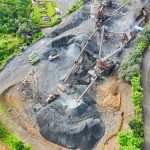Indonesia’s nickel reserves have given the country a key role in clean technology supply chains. As the global economy moves towards a just transition to a less carbon-intensive, more sustainable world, Indonesia and its international partners face a balancing act between lowering worldwide carbon emissions and protecting the environment and communities of nickel-rich regions from intensive mining.
Nickel Extraction for Clean Technology
Over the past decade, investments from Chinese firms have fortified the nickel industry in Indonesia. Today, about 90% of Indonesia’s nickel mines and smelting plants are Chinese-majority-owned, set up as joint ventures between international companies (including Brazilian, Korean, and Japanese corporations) and state-owned mining ventures like Mind Id [1]. Intermediary materials are then exported to be processed further into products like electric vehicle (EV) batteries in China, Japan, Norway, and the European Union, among others [2, 12].
Back in Indonesia, nickel mining expansion has had devastating consequences for the environment. Pollution from nickel mines, smelters, and coal plants has poisoned the water, and clearing forests to make room for industry has killed off entire ecosystems. Local communities in nickel-rich areas have had to entirely abandon their traditional ways of life. Customary land rights are regularly violated, and legal protections are either insufficient or go unenforced [3]. See more in the first article of this two-part series. Social and environmental impacts of the industry are discussed further in the first article of this two-part series.
As Indonesia enters into international partnerships, offering nickel so that other countries are able to reach their emissions targets, the global community must navigate these relationships with care, reckoning with the cost of climate action in wealthier countries being inextricably linked to mineral extraction in poorer ones [4].
Effective Climate Mitigation Beyond Mining
Criticism of environmental and labour practices has led to calls for fairer trade agreements.
European advocates, pushing for a more equitable exchange, posit that in return for critical materials, resource-rich countries like Indonesia should receive clean technology and investment in downstream development to ensure that ethical standards are upheld [9].
While improving the supply chain of clean technology for the purpose of more sustainable mobility suits the premise of a “Clean Industrial Deal”, the expansion of mining, deforestation, and other environmental disasters must be kept in check [7].
Ultimately, consumer countries must prioritize reducing demand. An effective climate strategy cannot focus around simply swapping diesel-burning cars for electric ones. A deeper transformation requires a systemic shift to more sustainable transportation. This involves reducing critical material demand by battery recycling, prioritizing public transit, and encouraging cyclist- and pedestrian-friendly infrastructure in urban areas [8].
Centering Workers in the Just Transition
In an effort to contribute to the global Just Transition, Indonesia has submitted a Nationally Determined Contribution (NDC), a program of climate action made in alignment with the Paris Agreement, which is considered by experts to be very ambitious for an emerging economy [13]. Supporting these efforts is the Just Energy Transition Partnership (JETP), the largest financing package for the energy transition so far, mobilizing USD 20 billion [14].
Indonesia has set a target to achieve net zero for all greenhouse gases by 2060, with one major caveat: the emissions of coal plants powering strategic industries like nickel mining are not counted [14]. The disparity between its ambitious climate goals and economic reliance on mining draws attention to the central challenge facing Indonesia’s sustainable growth and self-sufficiency.
With aspirations to become an “EV hub”, electrifying their transport and building a competitive industry, Indonesia might have to diversify their expertise beyond nickel for long-term success [11]. While two of the most common EV batteries typically use nickel (Nickel Manganese Cobalt (NMC), and Nickel Cobalt Aluminum (NCA)), another, the Lithium Iron Phosphate (LFP) type, which makes up about 40% of the market share, does not. The world’s largest EV manufacturer, China-based BYD, uses mostly non-nickel batteries, and even brought out a new sodium-ion type last year, a battery completely free of critical materials [9, 10].
With such a rapidly evolving EV industry, nations rich in critical minerals could begin to build long-term resilience to the volatile global market by investing in their population. A valuable aspect of the Just Transition is a robust and competitive labor force. Initiatives dedicated to improving domestic welfare build this capacity. The Prabowo-led government has set up the Free Nutritious Meal (MBG) program and the Red and White Village Cooperatives (KDMP), with the goal of alleviating rising costs of living. These efforts stimulate local economies and strengthen national self-sufficiency [11].
Additionally, any downstreaming plan must be accompanied by upskilling to be meaningful. With a green and tech skills education, workers could become more valuable themselves and adapt more easily in the case of an industry shift or crisis.
While nickel reserves might give Indonesia a strategic advantage in the EV battery industry for now, taking steps towards diversification could build long-term sustainable resilience of the workforce in the face of ever-innovating technology, and could gradually lessen the pressure on nickel extraction.
Balancing industry strength and climate action gives Indonesia the opportunity to put community resilience first. A just transition must, by nature, protect both the environment and the human rights of vulnerable communities. In Indonesia, the government, carmakers, and mining corporations must cooperate to ensure safe practices for the surrounding natural world. The extraction of critical materials does not have to follow the exploitative patterns of the past.





